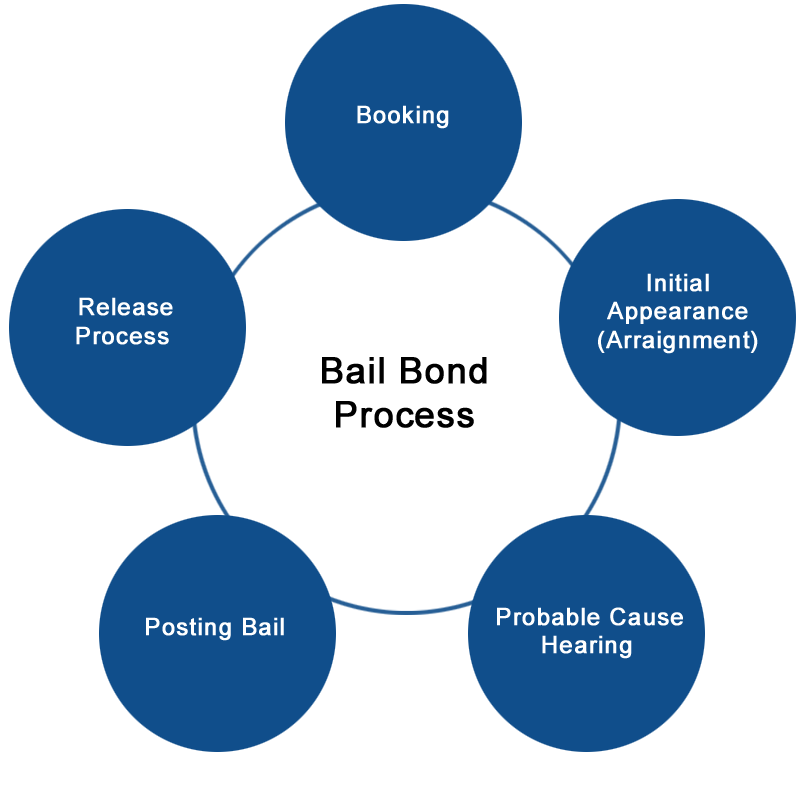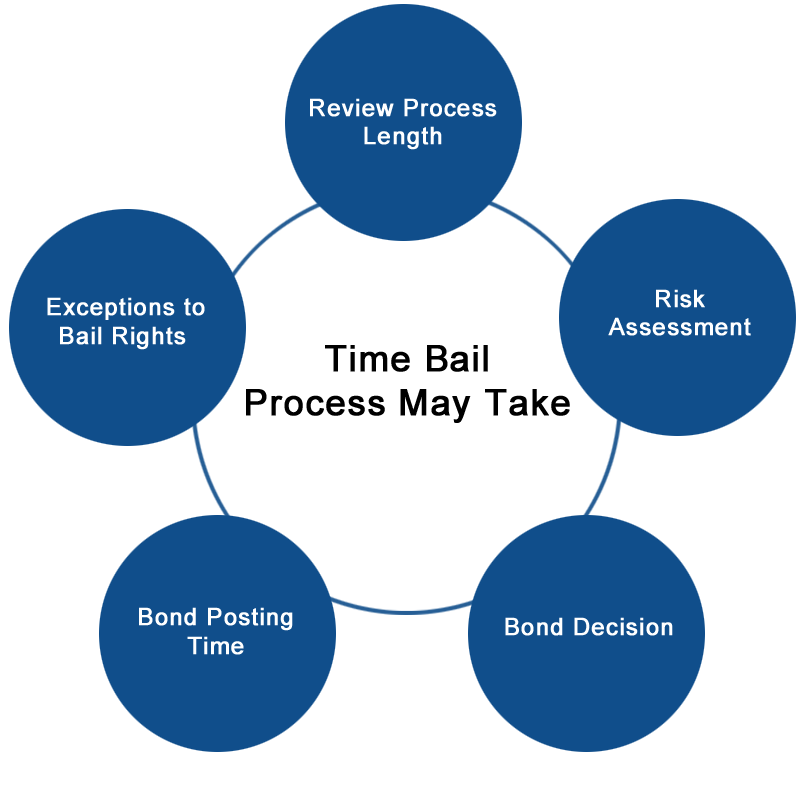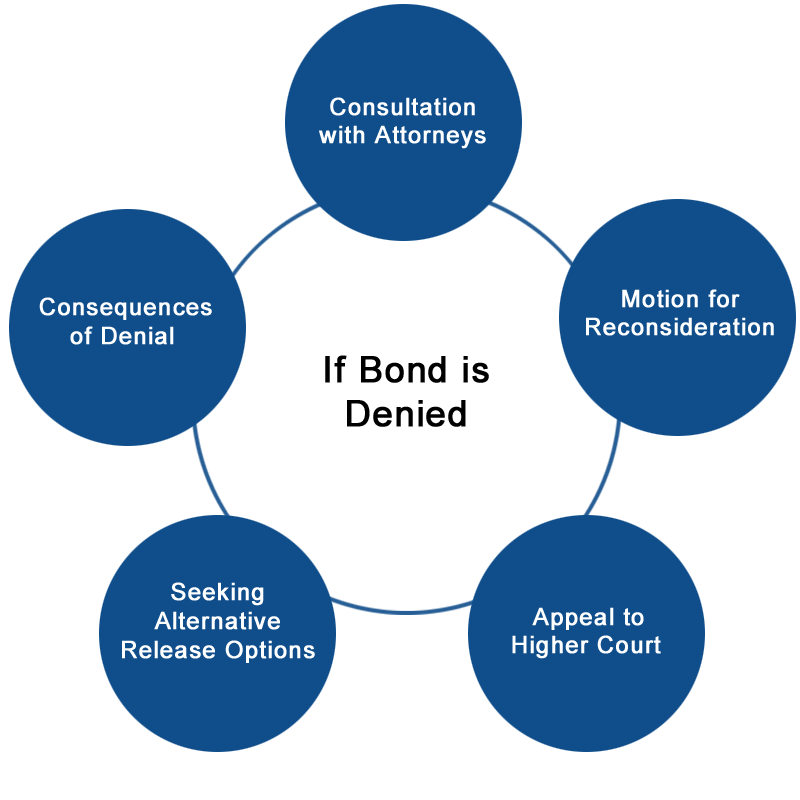 Bail Bond in Texas
Bail Bond in Texas
Before any trial or incarceration, those arrested in the state of Texas will first go through the bail process. While circumstances will vary, the process generally unfolds as follows:
- • First Step: Booking. This occurs at the police station, at which point the defendant’s information is recorded.
- • Second Step: Initial Appearance. Also called an arraignment, this usually occurs within the first 48-72 hours and gives the defendant a chance to learn the charges against them and enter a plea.
- • Third Step: Probable Cause Hearing. If the defendant remains in custody after the initial appearance, a probable cause hearing will see a judge setting the bail amount based on criminal history and the nature of the offense.
The amount determined by the judge can be posted either by paying the set amount outright or by utilizing a bail bond service. While a bail bond service may take several hours, it does allow a defendant to be released if they cannot pay the full amount. Once the bail has been posted, either directly or through a service, the defendant may be released from prison until their trial. This may not be immediate, however, depending on the availability of a court or the complexity of the case.
 While Texas law mandates a defendant be allowed to appear before a magistrate within 48-72 hours of arrest, there are several other factors that can impact the amount of time this entire process can take. These include:
While Texas law mandates a defendant be allowed to appear before a magistrate within 48-72 hours of arrest, there are several other factors that can impact the amount of time this entire process can take. These include:
- • Length of the Review Process: Before the defendant appears before a magistrate, law enforcement must first create a probable cause affidavit detailing the circumstances that led up to the arrest.
- • Assessment of Risk: As part of this same review process, the magistrate must examine several factors surrounding the defendant, including the severity of the offense, plus any criminal history, community ties and flight risk the defendant carries.
- • Bond Decision: The magistrate must reach their decision on a bond amount through careful evaluation and deliberation, determining the right bond amount and conditions to balance justice against the defendant’s rights.
- • Posting Bond: The amount of time it takes to either secure necessary funds to post the set bail amount, or to locate a bail bond service, can delay any potential release.
There are few exceptions to Texas’ laws granting defendants the right to a reasonable bail. A few of these include higher offenses such as capital murder, violating the conditions of a prior release, presenting a significant flight risk or being deemed a danger to the community. In these circumstances, a defendant may be required to remain incarcerated until trial.
While Texas law allows bail and bonds to be set for both misdemeanor and felony offenses, the specific conditions of that bail or bond will vary based on several conditions. The severity of the alleged offense and the defendant’s own criminal history, for example, will be considered, but there are other factors as well. The process for both is generally the same for both misdemeanors and felonies, but misdemeanor cases will typically carry lower bail amounts and shorter wait times for release.
If Bond is Denied
In certain cases, a judge will determine that a defendant isn’t eligible for release before trial. The decision to deny bond or bail is at the judge’s discretion and relies on several factors, including:
- • Seriousness of the Offense (e.g. domestic violence or abuse, terrorism, drug trafficking or distribution, organized crime, murder)
- • Prior Criminal History
- • Flight Risk
- • Risk to Public Safety or of Committing Additional Crimes
- • Threatening Witnesses or Law Enforcement
- • Single or Repeated Violation of Probation or Parole
- • Pending Charges in Another Jurisdiction or Immigration Court
- • Failure to Appear in Court
- Possession of Weapons or Firearms
- • Evidence Tampering
- • Probable Cause Hearing Outcome
- • Mental Health Concerns
 If this happens, the legal process provides the defendant with a right to appeal the judge’s decision. This process involves:
If this happens, the legal process provides the defendant with a right to appeal the judge’s decision. This process involves:
- • Consultation with Attorneys: This step is vital, as an experienced criminal defense attorney can evaluate the overall legal situation, the reasons given for denying bond, and the best strategies going forward.
- • Filing a Motion for Reconsideration: This motion, filed by the defendant’s attorney, urges the judge to review their decision while providing an opportunity to present supporting arguments and evidence. Such arguments could include addressing the judge’s concerns, highlighting ties to the community or demonstrating a lack of flight risk.
- • Appealing to a Higher Court: Should the motion for reconsideration be denied, the defendant’s attorney can file a notice of appeal to a higher court, presenting arguments to demonstrate why the bond denial was unjust or improper.
- • Seeking Alternative Release Options: If bond is denied, the defendant’s attorney still has several options worth exploring including pretrial services programs or electronic monitoring.
While these steps can all be taken following the denial of bond, the specifics will vary from case to case and from one jurisdiction to another.
If, however, the denial stands, the defendant will face various significant consequences. By remaining incarcerated until their case is resolved, they successfully appeal, or they face trial, a defendant loses their ability to effectively prepare a defense thanks to limited access to legal counsel, witnesses or evidence. Beyond that, they can suffer financial and emotional hardships due to loss of income and separation from loved ones.
This becomes a bigger problem if there are delays in the legal process leading up to trial, as these hardships worsen and the pressure builds to expedite release by pleading guilty. For these reasons and more, it’s crucial to secure effective legal representation as soon as possible.
If You Violate Bond
If a judge grants bail or bond, they will set a monetary fee that must be paid, along with other conditions of release. Under Texas law, failing to meet any of these conditions can result in the following:
Issuance of Arrest Warrant: The court will grant law enforcement authority to apprehend the defendant and bring them to court.
Revocation of Bond and Reincarceration: The defendant will be returned to police custody upon arrest, with the court potentially choosing to revoke their bond and keep them in custody until trial.
Increase or Forfeiture of Bail: As punishment for violating bond conditions, the court may choose to increase the bail amount, create stronger conditions for bond, or revoke the bond entirely in which case the defendant would forfeit the amount already paid.
Additional or Greater Charges: Depending on the nature of the bond violation, the court may choose to levy additional charges on the defendant or use that violation against them in their trial or other proceedings.
Frequently Asked Questions
How can I get my bond reduced?
Getting bond reduced is a matter of filing a motion with the court offering evidence as to why the amount was excessive. If the court agrees to a hearing after weighing the severity of the offense and ties to the community, an attorney can present evidence compelling the court to reduce the bail amount.
What if I can’t pay bail?
If you are financially unable to pay bail, you still have several options including going through a bail bond service, seeking release through pretrial services, or challenging the bail amount by filing a motion for a hearing.
Isn’t denying bail unconstitutional in Texas?
The Texas state constitution does not explicitly prohibit denying bail, but there are constitutional principles that must be adhered to in order to ensure fairness and protect defendants’ rights to challenge the court’s decision.
Can someone be released without bail or bond?
Depending on the severity of the crime or the defendant’s standing in the community, they can be released through alternatives such as pretrial services or a personal recognizance (PR) bond. This last alternative allows for release without bail as long as the defendant agrees to certain binding terms. These terms will vary by jurisdiction, but will generally require them to attend court hearings, avoid contact with those associated with the case, remain in the state and obey all laws.
What kinds of personal recognizance bonds exist?
Texas law proscribes several different types of PR bonds which can be issued as appropriate based on the individual case. These include a 90-, 30-, 15-, and 5-day PR bond, with the number of days reflecting the amount of time the defendant must remain incarcerated before release. Generally, a 90-day PR bond is reserved for felonies, with 30- and 15-day PR bonds used for misdemeanor crimes and 5-day PR bonds for misdemeanors that are punishable simply by a fine. Violating these PR bonds can result in the bond’s revocation and additional consequences.
If a bond is forfeited, can it be reinstated?
If the defendant fails to comply with the court’s terms, their bond my forfeited and the amount will be given to the state. An arrest warrant will be issued and whomever posted the bond may be liable for the full amount unless they can provide a good reason for the non-compliance in question. If bond is revoked, it may still be reinstated if the defendant remains compliant and agrees to additional requirements and fees.
What is a bail bond and how much does it cost?
Provided by a bail bondsman, a bail bond is a financial guarantee to the court that the defendant will comply with all conditions and may be released. It will typically run from 10-20 percent of the total bail amount. This is similar to a surety bond, which is paid by a third party, with the difference being that a surety bond requires payment of the full amount if the defendant fails to appear.
Can I leverage property as collateral to pay bail?
Depending on the circumstances, yes, you may put up personal property as collateral.
Do I need to live in Texas to bail someone out there?
No. Even if you live out of state, you can usually bail someone out if you meet the bail bond requirements.
Will I ever get my bail money back?
More than likely. If you comply with the court’s requirements and show up at all of your court dates, the bail that you paid directly to the court will be returned once your case is resolved.
You have rights under Texas law, rights that we will fight for. Just because you’ve been accused of a crime does not mean you are guilty. Our attorneys will work with the judge to help them reach a decision favorable to you, and we will never stop fighting until your liberty is secured. Whether that means securing a bond, contesting a revoked bond, reducing the bond amount or seeking a PR bond, we are here for you. Reach out today for a complimentary evaluation of your case today.
Call 1 (866) 875-5996 or Schedule a Free Case Evaluation Online
